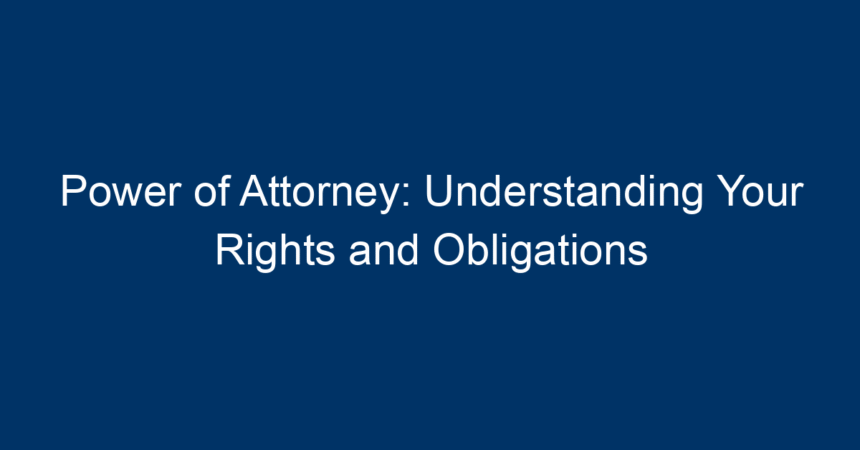Navigating the world of legal documents can feel overwhelming, especially when it comes to terms like "power of attorney." This powerful tool allows individuals to grant authority to another person to act on their behalf, making it essential to understand your rights and obligations under this arrangement. Whether you’re considering establishing a power of attorney for yourself or a loved one, understanding its intricacies will empower you to make informed decisions.
What is Power of Attorney?
A power of attorney (POA) is a legal document that enables one person, known as the principal, to designate another person, known as the agent or attorney-in-fact, to act on their behalf in legal or financial matters. This arrangement can be particularly beneficial for individuals who are unable to manage their affairs due to illness, absence, or incapacity.
Types of Power of Attorney
There are different types of power of attorney, each serving unique purposes:
-
General Power of Attorney: This grants broad powers to the agent to act on behalf of the principal in various matters, including financial transactions, legal affairs, and property management.
-
Durable Power of Attorney: Unlike a general power of attorney, the durable version remains effective even if the principal becomes incapacitated or mentally incompetent. This is particularly vital for individuals seeking long-term care management.
-
Limited Power of Attorney: This type specifies limited powers for a particular purpose or timeframe. For example, it may allow an agent to sell a property on behalf of the principal but does not grant them the authority to engage in broader financial transactions.
- Medical Power of Attorney: Also known as a healthcare proxy, this allows an agent to make healthcare decisions on behalf of the principal if they become unable to do so themselves.
Understanding these types helps in selecting the right power of attorney to suit your needs.
The Importance of a Power of Attorney
Establishing a power of attorney can save time, prevent complications, and ensure that your wishes are respected. Some key reasons to consider a power of attorney include:
-
Emergency Preparedness: In case of sudden illness or accidents, having a POA in place ensures that someone can make important decisions on your behalf.
-
Financial Management: A POA can manage your finances, pay bills, or handle taxes, relieving you of stress during difficult times.
-
Healthcare Decisions: A medical POA can ensure your healthcare preferences are honored when you’re unable to communicate them.
- Asset Protection: Properly executed, a power of attorney can help protect your assets by allowing trusted individuals to manage your affairs.
Your Rights as the Principal
As the principal in a power of attorney arrangement, you retain significant rights, including:
-
Choosing Your Agent: You have the right to select someone you trust as your agent. It’s crucial this person acts in your best interests.
-
Revocation: You can revoke a power of attorney at any time as long as you are mentally competent. This allows you to change agents or terminate the agreement altogether.
-
Setting Limits: You can specify which powers you grant to your agent and under what circumstances they can be exercised, particularly in limited or conditional POAs.
- Monitoring and Accountability: You have the right to monitor your agent’s actions. They are obligated to act in your best interest and are accountable for their decisions.
Your Obligations as the Principal
While you have rights as a principal, there are also obligations to keep in mind:
-
Informed Decision Making: It’s essential to understand what you’re signing. Ensure you know the implications of granting someone power over your affairs.
-
Regular Communication: Maintain open communication with your agent. Make your preferences known and ensure they understand your values and wishes.
- Timely Updates: If your circumstances change, such as your health status or personal relationships, you may need to revise or update your power of attorney.
Responsibilities of Your Agent
Your agent holds significant responsibilities, which include:
-
Fiduciary Duty: The agent is legally obligated to act in the best interests of the principal. This means making decisions that are not beneficial only to themselves but also to the principal.
-
Financial Management: The agent must handle financial transactions and assets prudently. This might include keeping accurate records and providing timely reports on financial activities.
-
Healthcare Decisions: If you’ve designated your agent to make medical decisions, they must understand your health care preferences and make choices that align with your wishes.
- Legal Compliance: The agent must comply with the laws governing powers of attorney in your jurisdiction to avoid potential legal issues.
Risks and Limitations of Power of Attorney
While a power of attorney provides many advantages, there are inherent risks and limitations to be aware of:
-
Abuse of Power: Trusting someone with a power of attorney can lead to risks of abuse or exploitation. Selecting a trustworthy individual is crucial.
-
Limited Scope: If a power of attorney is too limited, the agent may not be able to act effectively on your behalf in all necessary situations.
-
Legal Challenges: Other family members may contest the decision, especially if they have concerns about the agent’s competency or intentions.
- Expiration: Certain types of power of attorney can expire after a specified period or under certain conditions. Ensure that you review and update your POA as required.
Conclusion: Empower Yourself with Knowledge
Understanding the nuances of power of attorney is essential for making informed choices about your affairs and health care. Embracing this legal tool not only empowers you but also provides security and peace of mind for you and your loved ones.
Actionable Insights
-
Consult a Lawyer: Seek legal advice to tailor a power of attorney that meets your individual needs and complies with state laws.
-
Choose Wisely: Select an agent who is trustworthy and capable of handling your affairs responsibly.
-
Review Regularly: Periodically assess your power of attorney to ensure it aligns with your current circumstances and wishes.
- Educate Family Members: Keep your family informed about your power of attorney and your wishes, which can help avoid disputes in the future.
Incorporating a power of attorney into your planning can greatly alleviate future complications, ensuring that you have your wishes respected and your rights protected.




